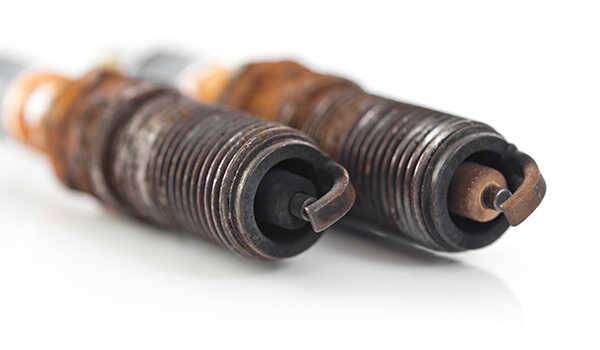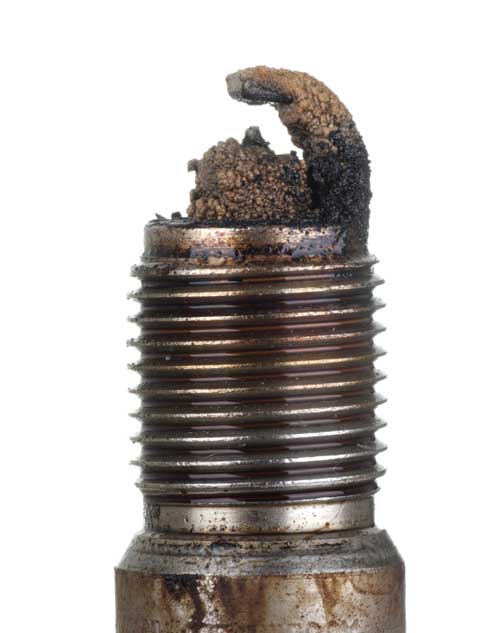Are you tired of dealing with spark plug problems? Do you find yourself asking, “Why does my spark plug keep fouling?”
You’re not alone. Spark plug fouling is a common issue that can lead to frustrating engine performance and costly repairs. When your engine isn’t running smoothly, it can feel like you’re battling an unseen enemy. But what if you could understand what’s causing the problem and how to fix it?
This article will guide you through the possible reasons why your spark plug keeps fouling, offering insights that could save you time, money, and headaches. Get ready to discover how you can reclaim control over your engine’s performance and enjoy a smoother ride.

Credit: www.autosuccessonline.com
Common Causes Of Spark Plug Fouling
Spark plug fouling can cause engine misfires and poor performance. It’s important to know why this happens. There are several common causes. Understanding these can help you prevent fouling and keep your engine running smoothly.
Oil Contamination
Oil can leak into the combustion chamber. This is a common cause of fouling. It coats the spark plug, disrupting its function. Check for worn piston rings or valve guides. These can lead to oil leaks.
Carbon Deposits
Carbon deposits form from incomplete fuel combustion. They collect on the spark plug, affecting performance. Regular maintenance can help reduce carbon buildup. Ensure your engine runs efficiently to avoid this issue.
Fuel Additives
Some fuel additives can cause spark plug fouling. They leave residues that affect performance. Use additives that are compatible with your engine. Read labels carefully before adding them to your fuel.
Incorrect Heat Range
Using the wrong heat range spark plug can lead to fouling. It can’t handle the engine’s temperature. Always use the recommended spark plug for your vehicle. This ensures optimal performance and prevents fouling.

Credit: www.autosuccessonline.com
Symptoms Of A Fouled Spark Plug
Recognizing the symptoms of a fouled spark plug can save you a lot of headaches and money. A spark plug that isn’t functioning properly can lead to a variety of issues that affect your car’s performance. Understanding these symptoms will help you take timely action and keep your vehicle running smoothly.
Engine Misfires
One clear sign of a fouled spark plug is engine misfires. You may notice your engine stuttering or hesitating when you press the gas pedal. This is because the spark plug isn’t firing correctly, disrupting the combustion process.
Misfires not only affect performance but can also damage other engine components over time. It’s like trying to run with a pebble in your shoe—uncomfortable and potentially harmful.
Poor Fuel Efficiency
If you find yourself visiting the gas station more often, your spark plugs might be to blame. A fouled plug can cause incomplete combustion, wasting fuel. This means your engine is burning more fuel than necessary to produce the same amount of power.
Keeping an eye on your fuel gauge can give you early hints of spark plug trouble. A sudden drop in fuel efficiency is a red flag that shouldn’t be ignored.
Difficulty Starting
Ever turned your car key and heard a sluggish start? This could be a result of fouled spark plugs. They struggle to produce the necessary spark to ignite the air-fuel mixture in the engine.
Next time your car hesitates to start, consider checking your spark plugs. Ignoring this can leave you stranded at the most inconvenient times.
Rough Idling
Does your car vibrate or shake while idling? This rough idling might be due to faulty spark plugs. When a spark plug is fouled, it can cause uneven fuel burning, leading to a shaky engine when your car is stationary.
Imagine sitting at a traffic light, feeling your car quiver beneath you. It’s unsettling and a clear signal that your spark plugs need attention.
Have you experienced any of these symptoms? Addressing spark plug issues early can prevent more costly repairs down the road. Check your spark plugs regularly and ensure your car performs at its best.
Diagnosing The Problem
Spark plug fouling occurs due to oil leaks, rich fuel mixtures, or carbon build-up. Identifying these causes prevents engine performance issues. Regular maintenance and inspection help ensure smooth operation.
Diagnosing the problem of a fouling spark plug can be a real puzzle for any car owner. You might have noticed performance issues, but understanding the root cause is vital to prevent it from happening again. Let’s dive into some practical steps you can take to identify the culprit behind your spark plug woes.Visual Inspection
Start by removing the spark plug from your engine. Look closely at its condition. Does it appear black and sooty? This often means your engine is running too rich, burning more fuel than necessary. If it’s oily, there might be an oil leak. Each visual clue points to a different problem. A friend once showed me how a visual inspection saved him money. He found a cracked spark plug which was causing misfires. Replacing it fixed the issue immediately.Testing Spark Plug Performance
Use a spark plug tester to check its performance. This simple tool can reveal if your spark plug is firing correctly. If the spark is weak or inconsistent, it might be time for a replacement. Remember that spark plugs have a lifespan. If yours is nearing the end, performance will drop. Testing can confirm this.Analyzing Engine Codes
Modern cars are equipped with onboard diagnostic systems. Plugging in a code reader can give you a wealth of information. Codes related to misfires or fuel systems can directly point to why your spark plug is fouling. Have you ever wondered what those dashboard lights mean? They’re often the key to diagnosing spark plug issues. By identifying specific codes, you can narrow down the problem and take action. Ask yourself, when was the last time you checked your engine codes? It’s a quick way to spot trouble before it escalates.Preventive Measures
Frequent spark plug fouling might be due to incorrect heat range or poor fuel quality. Ensure proper air-fuel mixture and timely maintenance. Regularly check for oil leaks and replace air filters to prevent residue buildup.
Preventive measures can help keep your spark plugs from fouling. Regular care and attention can extend their life. Let’s explore some effective strategies.Regular Maintenance
Regular maintenance is key to spark plug health. Inspect your spark plugs often. Clean them to remove deposits. Replace them if necessary. A clean engine runs more efficiently. This reduces the risk of fouling.Choosing The Right Spark Plug
Choose spark plugs that fit your engine. Different engines need different types. Check your vehicle’s manual. It will guide you to the right choice. Correct spark plugs ensure optimal performance.Monitoring Oil Levels
High oil levels can lead to fouling. Check your oil levels regularly. Keep them within the recommended range. Too much oil can cause spark plug issues. Proper oil levels protect engine parts.Avoiding Short Trips
Short trips can cause spark plug fouling. Engines need time to reach optimal temperature. Frequent short trips prevent this. Plan longer journeys when possible. It helps keep your spark plugs clean.Effective Solutions For Fouled Spark Plugs
Persistent spark plug fouling often stems from rich air-fuel mixtures or oil contamination. Address these issues by checking fuel adjustments and inspecting engine seals. Regular maintenance ensures cleaner combustion, preventing future fouling.
Fouled spark plugs can be a frustrating issue, but there are effective solutions you can explore. Understanding the root cause is the first step to fixing the problem. Once you know why your spark plug is fouling, you can take action to prevent it from happening again.Cleaning The Spark Plug
Start by cleaning your fouled spark plug. Use a wire brush or a specialized spark plug cleaner to remove carbon deposits. If you’ve ever found yourself stuck on the side of the road, you know the importance of carrying a small toolkit. A clean spark plug can restore your engine’s performance.Adjusting Fuel Mixture
Your engine’s fuel mixture might be too rich, causing your spark plugs to foul. Adjust the air-fuel mixture to ensure proper combustion. You’d be surprised how a simple adjustment can drastically improve your engine’s efficiency.Replacing With Correct Heat Range
Using the wrong heat range spark plug is a common mistake. Ensure you replace it with one that matches your vehicle’s specifications. This simple swap can save you from the headache of frequent fouling.Engine Tune-up
Regular engine tune-ups can prevent spark plug fouling. During a tune-up, mechanics check various engine components, ensuring everything works in harmony. Have you ever noticed how your car runs smoother after a tune-up? It’s because all parts, including spark plugs, are optimized for performance. Is your car’s performance declining? Consider these strategies to keep your spark plugs in top shape. Addressing the root cause of fouling will enhance your vehicle’s longevity and reliability.When To Seek Professional Help
Your spark plug keeps fouling, and you’ve tried everything from cleaning to replacing it, but the problem persists. It’s frustrating, isn’t it? Sometimes, a little professional help can go a long way. Knowing when to call in the experts can save you time, money, and a whole lot of stress. Let’s dive into the situations where seeking professional help is your best bet.
Persistent Fouling Issues
If your spark plug fouling issue is recurring despite your efforts, it might be time to consult a mechanic. You may have checked the fuel mixture and even cleaned the plugs regularly, yet the problem remains. A professional can look deeper, identifying underlying issues that are not apparent to the untrained eye. They can pinpoint the root cause, offering solutions that you might not have considered.
Complex Engine Problems
Sometimes, the fouling of spark plugs is a symptom of a larger engine problem. Have you noticed unusual noises or a drop in performance? These could be signs of complex engine troubles that require expert attention. Mechanics have the expertise and experience to diagnose and fix issues that might be too complicated for a DIY approach. Save yourself the headache and potential engine damage by seeking professional help.
Advanced Diagnostic Tools
Professionals have access to advanced diagnostic tools that can provide insights beyond what you can achieve at home. These tools can detect problems with your ignition system, fuel injectors, or even engine compression. While you might have a basic understanding, these tools provide precise information that guides effective repairs. Imagine how much faster and easier troubleshooting could be with the right equipment!
Have you ever thought that persistent fouling could be a sign of more serious issues? It’s worth considering the benefits of professional diagnostics. Sometimes, the most efficient way to solve a problem is to let an expert take over. After all, your car deserves the best care possible, and you deserve peace of mind.

Credit: www.youtube.com
Conclusion
Identifying why your spark plug keeps fouling is crucial. Regular maintenance helps prevent future issues. Check your fuel mixture and engine oil. Ensure proper air intake and exhaust flow. Replace worn-out plugs promptly. Consult a mechanic if problems persist. Keep your engine running smoothly.
Avoid costly repairs with timely checks. A well-maintained engine performs better and lasts longer. Remember, small steps make a big difference. Take care of your vehicle for a safer drive.
